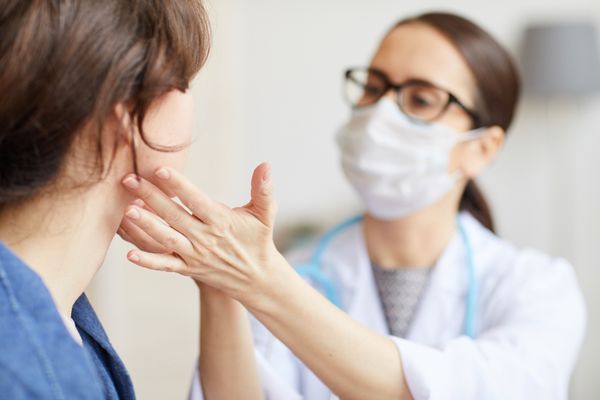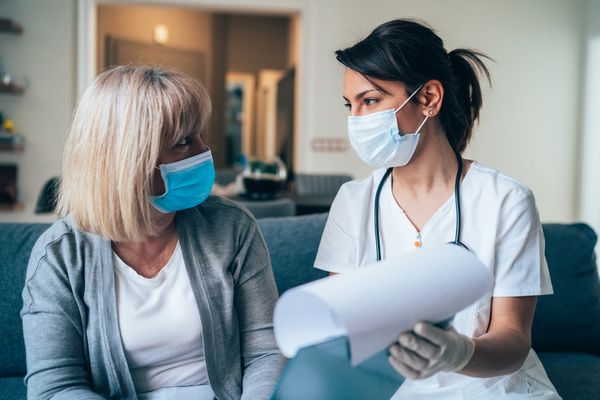Continue the positive health habits you have already established, including regular visits to your health care professional for preventive health screenings. If you are at high risk or have a family history of health problems, or you have serious medical conditions, you'll need additional screenings and checkups beyond the basic recommendations listed here:
Blood pressure test for hypertension: Have your blood pressure taken at least every two years; more often if it is at or above 120/80 mm Hg.
Bone mineral density exam/bone mass measurement: Get screened at age 40 only if you are at increased risk for osteoporosis or low bone density because of using certain medications; have a disease or condition known to be associated with bone loss; or if you have recently broken a bone under certain circumstances.
Breast self-exam: Some health care professionals suggest doing a breast self-examination each month. However, research has shown that BSE plays a small role in finding breast cancer compared with finding a breast lump by chance or simply knowing what is normal. If you choose to perform a monthly BSE, ask your health care professional to show you how to perform one.
Cholesterol: Have your blood cholesterol tested every five years or more frequently if you have risk factors for heart disease.
Clinical breast exam: Starting at age 40, you should talk with your health care professional about getting this exam. Screening recommendations vary on whether this is beneficial in combination with a mammogram, so talk with your health care provider about whether it's right for you. If so, your doctor or other health care professional will examine your breasts for any abnormalities, often as part of the annual gynecologic examination.
Dental exam: Visit the dentist regularly. Checkups can detect early signs of oral health problems and bone loss. Professional tooth cleaning is also important for preventing oral problems and is usually done every 6 to 12 months.
Diabetes blood glucose (sugar) test: You should be screened every three years starting at age 45; more often or earlier if you're overweight or have other risks for diabetes. Ask your health care professional whether he or she recommends a blood glucose test for you.
Eye exam: The American Academy of Opthalmology now recommends that starting at age 40, adults with no risk factors or signs of eye disease get a baseline eye screening. Then based on the results of that initial screening, an ophthalmologist will prescribe the necessary follow-up exams. For people of any age with symptoms of eye disease or risk factors such as diabetes, high blood pressure, or family history of eye problems, the academy recommends they see an ophthalmologist to determine how often they should have their eyes examined.
Mammography: Beginning at age 40, you may be offered an annual mammography to screen for breast cancer. Guidelines on breast cancer screening vary, so talk to your health care professional about what's right for you. Some doctors prefer to begin screening at age 50 or only offer it every two years.
Pap test and pelvic exam: Get a Pap test every three years or both a Pap test and an HPV test every five years (you can get both tests at the same time). The Pap test screens for abnormalities that could indicate pre- or early cervical cancer. Exception: If you have risk factors such as previous abnormal screening results, multiple sex partners, a weakened immune system, a history of DES exposure in utero or HIV infection, you should have a Pap test every year. Talk to your health care professional about what's right for you.
Remember: Don't confuse your Pap test with a gynecologic examination. The American Academy of Obstetricians and Gynecologists (ACOG) recommends a gynecologic examination, including a pelvic exam, annually.
Sexually transmitted diseases (STDs): If you have a history of chlamydia or other STDs or you or your partner have had multiple sex partners, ask your health care professional about whether you need to be screened for STDs, including gonorrhea and HIV.
Skin exam for skin cancer: Examine your skin once a month for changes, such as moles that change color, shape or size. If you have risk factors for skin cancer, you may need periodic skin exams by a dermatologist or other health care professional. Talk to your doctor about what's right for you.
Thyroid test (TSH): Recommendations vary. The American Thyroid Association recommends having a TSH screening test at age 35 and then once every five years. The American Academy of Family Physicians does not recommend screening patients before age 60. And, the U.S. Preventive Services Task Force states that there's not enough evidence to recommend for or against thyroid screening in adults. Ask your health care professional for guidance.
Weight: Obesity screening is now considered a preventive checkup. Ask your health care professional for more information on healthy weight guidelines or weight-management strategies.
Immunizations:
Hepatitis A: This vaccine is recommended for adults who live, work or travel in areas where hepatitis A is endemic and periodic outbreaks occur, or users of injection or street drugs, military personnel, institutionalized persons and those working in those institutions.
Hepatitis B: All pregnant women should be screened for hepatitis B at their first prenatal visit. The Hepatitis B vaccine is recommended for all children and adolescents not previously immunized and for all adults at high risk for infection; high risk individuals include persons who are injection drug users and their sexual partners; anyone with a history of multiple sexual partners in the previous six months or who has recently acquired a sexually transmitted disease; recipients of certain drug products; individuals with a health-related job with frequent exposure to blood or blood products; and travelers to countries where hepatitis B virus(HBV) is of high concern.
Influenza (flu): You need a dose every fall (or winter) to protect you and those around you from the flu.
Pneumococcal: You need one to two doses if you smoke or if you have certain chronic medical conditions.
Tetanus: You should receive tetanus booster shots every 10 years.
Before any tests are ordered, it's important to have a conversation with your health care professional about your medical history and what perimenopause is all about.
To get the most out of your medical appointments, make sure to come to prepared with questions. Use these questions to ask your health care professional as a guide.







